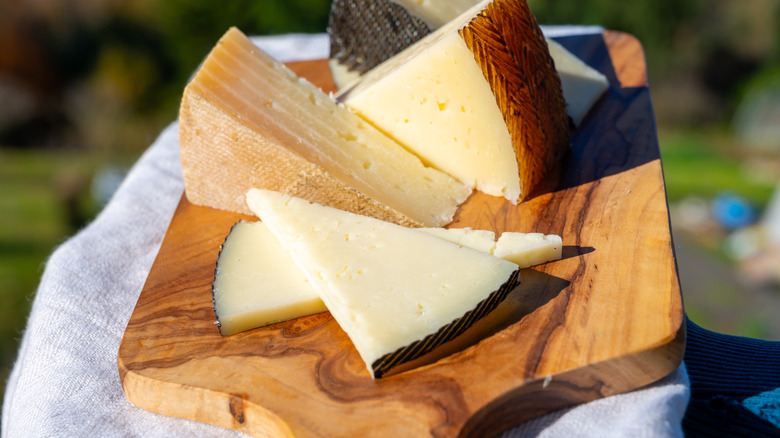What You Should Know About Using Cheese To Attract Birds To Your Yard
We may receive a commission on purchases made from links.
If you've ever seen a seagull dive bomb someone's cheeseburger or ice cream cone, you'd scarcely believe that birds are lactose intolerant. Yet it is true that birds lack the enzymes required to digest dairy. Which makes sense, actually, since they're not mammals, but egg-hatched avians who don't produce milk.
However, that doesn't mean that you can't safely attract birds to your yard with the right kind of cheese in proper amounts. Since most cheeses are fermented, it's okay to offer them to birds in small doses. That's because much of the lactose in cheese is pre-digested during the culturing process. As a general rule, the more aged — or hard — the cheese, the less lactose remains. Hard cheeses that come in blocks – like parmesan, gouda, Swiss, and cheddar — are the safest to share with our avian friends.
Several cheeses are not fermented, though, and should be avoided. These fresh, un-ripened cheeses include cottage cheese, ricotta, goat cheese, cream cheese, and paneer. These are generally very soft, spreadable cheeses. American cheese is also a no-no because it's a "pasteurized process cheese product" and not really a cheese at all. Other soft cheeses that have a short ripening period are also not advised. These include brie, camembert, blue cheese, and the like. Bottom line: stick to the harder cheeses when offering it to wild birds, and keep the fancy stuff for humans.
The ins and outs of giving cheese to birds (the right way)
Before you break out the charcuterie boards, know that birds shouldn't have a lot of cheese in their diets. Even though they need fat and protein to survive, they have other sources for those such as bugs and worms. The best way to share a little bit of this rich treat with birds is to grate a small amount of the hard cheese of your choice and leave it in an area where birds are already used to finding food. You don't need to put it in a feeder, just leave it on a table or the ground for them to find. If they don't finish the cheese, be sure to discard it before it rots or molds. Not only is moldy cheese unhealthy for the birds, but uneaten food could attract other less desirable wildlife.
If you see that your feeding efforts have become a surefire way to attract birds to your yard, you might look at branching out with some other protein-rich treats such as dried mealworms. Or try leaving out a little bit of canned cat or dog food. If you have any leftover eggs, you can cook them up and put them out with their crushed eggshells. Birds will eat the eggshells for much-needed calcium, which is especially important for females during egg-laying season.
A final word about the safety aspects of feeding cheese to birds
It's important to keep in mind that offering birds things they might not readily find in nature is okay in moderation, but it's not necessary for their survival in good times. For backyard bird enthusiasts, offering cheese serves as a way to observe and enjoy more species. But too much of a good thing — or the wrong things — can be harmful to wild birds.
The U.S. Fish and Wildlife Service will tell you that feeding wild animals is generally a bad practice. While feeding, say, a bear would never be okay, they are willing to bend a little in the case of birds. And that's mainly because extreme winters and migration can be hard on birds and many of us are now squatting on what used to be their former feeding grounds.
The best advice is to feed birds in moderation and follow these three tenets of safety: (1) Avoid spreading disease by keeping the food and feeders fresh and clean, (2) always offer the supplemental food in locations that won't lure predators, and (3) don't ever place food or feeders near windows that birds might inadvertently fly into. If you want to give cheese a try, proceed with caution and mind the above specifications about which cheeses are okay. If you would prefer some cheese-free alternatives, you can try landscaping with bird-friendly garden plants. You can also create a gorgeous berry garden that will provide beauty and sustenance all year long.


